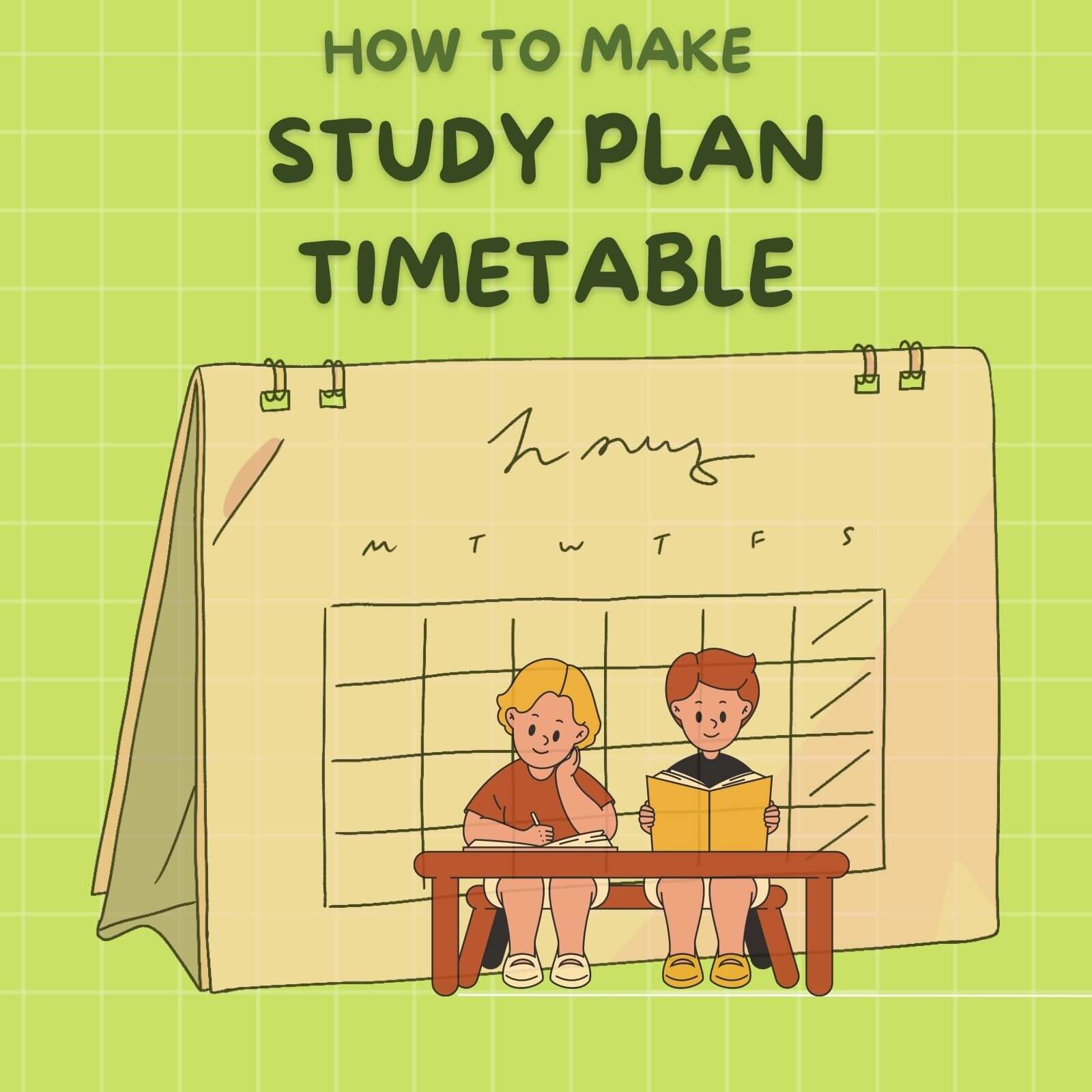Study plan timetable is a systematically organised schedule for a student who grabs responsibilities for learning activities, goals and routine daily tasks. It assists the students in motivating them and executing their academic goals.
Self Study Plan – Self-study plan is a schedule of a student that is structured by them, moreover, having their own time and own learning sessions.
CONTENT INDEX
WHY STUDY PLAN TIMETABLE IS IMPORTANT FOR STUDENTS TO STUDY
- Build confidence – A study plan helps the students to build confidence in completing their own tasks. Students have faith in them and a positive approach in their minds.
- Time management – The study plan timetable helps the students to manage their time to do their daily routine tasks. Students have a piece of cake for difficult topics to cover early in their study plan.
- Makes discipline students – In a good study plan, the student follows and ensures all their crucial activities are listed. This ensures time management along with the discipline to stick to their study schedule. This leads to focusing and concentrating on one task and reduces the stress of whole task.
- Consistency towards goals – As “consistency in the work is the key to success.” Student follows their study plan timetable and gains knowledge to succeed with consistent efforts on their goals.
- Prevents procrastination – The study plan timetable shows the students what to do at a particular time. This allows student to stick to their timetable without wastage of time and energy on a daily task.
- Achieve better results – Following a study plan, the student completes their targets with their efforts regularly to execute the set goals.
PROS AND CONS OF MAKING STUDY PLAN (Advantage/Disadvantage)
PROS – Advantages
- Organised – Organising the study plan for the set goal leads to a systematic way of learning.
- Targets achieved – It reminds you of what you have to do and when thus leads the achievement of a small targets.
- Reduce stress – When you complete the small tasks, you feel more relaxed and happy.
- Prevents confusion – As it is already planned, confusion does not create in the minds of students.
- Better results – Consistency with a good study plan gives better results in academic goals.
- Enhance productivity – Essential tasks are done at the right time to increase the productivity of students.
- Self development – Developing good habits for learning new skills enhances self-development and self-esteem. Working on it, you create your “best version of yourself.”
- Plan for the future – Developing a disciplined life leads to gaining knowledge and practical skills and thus leads to securing a future life.
- Enjoy the challenge – Following a study plan timetable, strong tasks challenge the students and joy to success.
- Gaining the knowledge – Learning in the right direction in a good study plan, students understand the basics of the course and gain knowledge.
CONS – Disadvantages
- Procrastination – Without a best study plan timetable, students delay studying. Hence waste of time and energy is a destructive factor.
- Confusion – Not making a study plan timetable, students have confusion about what to do at a particular time.
- Low Retention – Those students who study only one day before the exam have low retention power.
- Time management – Students take lightly covering up their daily tasks, and hence, they do their work at any time.
- Average performance – Without making a study plan schedule, students put their efforts into the wrong way. Then they do not complete their tasks at the right time. Thus they score low.
- Anxiety issues – Students do not study earlier and do not cover the whole syllabus. This causes anxiety issues.
HOW CAN I FOLLOW STUDY PLAN PROPERLY? (Study Plan Template)
| Mon | Tue | Wed | Thurs | Fri | Sat | Sunday | |
| 5:00 am – 5:30 am | Wakeup, Morning Routine and 10-15 min for Exercise |
||||||
| 5:00 am – 5:30 am | Study Session 1 | Revision | |||||
| 7:00 am – 7:30 am | Breakfast and Ready to go School | Breakfast | |||||
| 7:30 am – 2:30 pm | School Time | Revision and Complete Assignment | |||||
| 2:30 pm – 3:30 pm | Lunch time and Rest | Lunch time | |||||
| 3:30 pm – 5:00 pm | Study session 2 | Revision | |||||
| 5:00 pm – 5:30 pm | Snacks time and Walk | Snacks time and Walk | |||||
| 5:30 pm – 8:00 pm | Study session 3 | Revision | |||||
| 8:00 pm – 9:00 pm | Dinner time and Family time | Dinner time | |||||
| 9:00 pm – 11:00 pm | Study session 4 | Revision | |||||
| 11:00 pm – 11:30 pm | Bedtime Routine | Bedtime Routine | |||||
| 11:30 – 5:00 am | Sleep |
||||||
HOW TO STUDY EFFECTIVELY FOR LONG HOURS
- Pomodoro technique – Pomodoro technique is a time management method in which student study for 25 min and take another 5 min break in 30 min set. Or student study for 45-50 min and take another 10-15 min for a break in a 1-hour set. It keeps your brain in proper function.
- Eat healthy – Vegetables intake promotes better brain function and overall health. Red, green and orange vegetables contain carotenoid pigments that benefit mental performance. Dark chocolates and cocoa products have flavonoid compounds that help to increase blood flow to your brain and improve memory and reaction time. Including nuts, eggs, curd, oatmeal and dried fruit as less sugar contain foods that help to reduce tiredness.
- Exercise – Doing 15-20 min exercise in a day makes your mind active. It strengthens your physical body as well.
- Cover difficult topics early – Focusing on difficult topics first in your study timetable feels you motivated. In the end, you have fewer burdens.
- Organise your study table – Organize your study table with important stuff only. The study table should be clean, which gives you positive vibes.
- Proper sleep – Take proper sleep to boost your memory power. Proper sleep gives mental peace and stress-free life.
- Stay hydrated – Keeping your body hydrated, the faster the brains process information. A person should drink 3-4 litres of water a day.
Some Queries
Query1: What is the trick to study?
Ans.: Including the 3R’s- Read, Recall and Revise, first, read the content thoroughly, then recall what you understand, and, finally, revise all the contents in short that you read.
Query2: How to memorize 1 page in 10 minutes?
Ans.: Make short notes including key points on 1 page, and then memorize them.
Query3: When do you need to make a plan?
Ans.: Since you decide to accomplish your goal, you’ll make a strategy for how to do it, and then, you need to make a study plan.
Conclusion
“A Goal Without A Plan Is Just A Wish.” Make a study plan timetable, stick to it and have faith in yourself. Take small tasks and achieve them to your goals.
Riya utwal





Thankyou so much very helpful for students